Theology

Recently, a large wealthy church decided to break up with my denomination. I’m not 100 percent sure I know why. But the no-regrets explanation they wrote implied that religious differences between us were too severe for them to stay committed to our relationship.
Religion has a way of making people do extraordinary things to create peace and unity. It also, as we know well, has a destructive capacity to turn people against one another. It can make us grip our convictions so tightly that we choke out their life. We chase others away, then say “Good riddance” to soothe the pain of the separation. Even more alarming, too many religious people insist on isolating themselves and limiting their imagination about where and how God can be known.
All these realities take on a sad irony when we read about God promising to be outside the walls, present with different people in different places. What does it look like when God defies the restrictions we presume are in place?


FOR GENERATIONS, Native North Americans and other Indigenous peoples have lived the false belief that a fulfilled relationship with their Creator through Jesus required rejecting their own culture and adopting another, European in origin. In consequence, conventional approaches to mission with Indigenous peoples in North America and around the world have produced relatively dismal outcomes.
The result has subjected Indigenous people to deep-rooted self-doubt at best, self-hatred at worst.
One of the more egregious examples of the “conventional” approach in Canada involved the church-run residential schools. Indigenous children were taken from their families, prevented from speaking their native languages, and subjected to various other forms of abuse.
Isabelle Knockwood, a survivor of church-run residential schools, observed, “I thought about how many of my former schoolmates, like Leona, Hilda, and Maimie, had died premature deaths. I wondered how many were still alive and how they were doing, how well they were coping, and if they were still carrying the burden of the past on their shoulders like I was.”
Given the countless mission efforts over the past four centuries (which in practice were targeted not so much to spiritual transformation as to social and cultural annihilation), we might conclude that Indigenous people must possess a unique spiritual intransigence to the gospel.

One sort of Christian believes taking Eucharist weekly saves her. Another Christian believes his confession of Jesus Christ as Lord saves him. Still another looks to his Baptism. Another to her participation in the body of Christ. One to his repentance. And another to her care for the sick, the hungry, the prisoner, and the poor.
We elevate one belief or practice over another, then divide ourselves as Christ followers by the priority we set when, in fact, all of these are taught as saving by Christ, who alone is our salvation.
Christ saves me, not the accuracy and purity of my beliefs. Christ saves me, not my works. Christ saves me, not the measure of my adherence to a doctrine or practice.
When all is said and done, many Christians tend to look to their habits, their faith, and their perseverance when it comes to salvation rather than to the work, belief, and faithfulness of Christ in us, over us, under us, and through us.
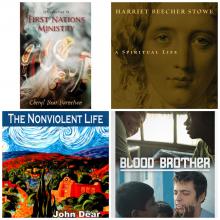
Faith and Reform
Writer and social reform Harriet Beecher Stowe’s controversial 1852 novel Uncle Tom’s Cabin brought many people to the anti-slavery movement. In Harriet Beecher Stowe: A Spiritual Life, biographer Nancy Koester illuminates the shifting role and expression of faith in Stowe’s personal and public life and work. Wm. B. Eerdmans
Falling into Love
A few years ago a young man named Rocky Braat left Pittsburgh to wander India; he’s ended up working for years in an orphanage for HIV-positive children there. His friend, filmmaker Steve Hoover, went to explore why. The result is a Sundance-award-winning documentary, Blood Brother. www.bloodbrotherfilm.com
AS AN EVANGELICAL pastor of a multiethnic church in New York City, I often find myself at the intersection of lively discussions about race. These conversations almost inevitably lead to a familiar question: What does the church do now? Maybe stated another way, “How do we work toward the dream of the beloved community?” This is why I find Edward Gilbreath’s Birmingham Revolution: Martin Luther King Jr.’s Epic Challenge to the Church to be a timely and necessary read.
While many books have been written on Dr. King and civil rights, Birmingham Revolution places King’s faith at the foreground of the writing. This is an important distinctive as King has often been co-opted, by conservative and liberal agendas alike. Yet history cannot deny that prayerful action, and a gospel that took seriously the social dimensions of human life, were at the very heart of King’s theology.
Birmingham Revolution hones in on the year 1963—a time when the Southern Christian Leadership Conference took the civil rights efforts into the bowels of structural racism. Brown vs. Board of Education had provided an important Supreme Court victory in 1954, but many forms of local resistance to desegregation prevailed in the South.
To compound the drama, many advocates in Alabama, both black and white, believed further progress should happen through legal means. They had a misplaced confidence that local structures would uphold federal law, despite the continued presence of the KKK and other such groups. Gilbreath explains Birmingham’s defining moment not only in confronting segregation, but also in challenging the subtler, unwittingly complicit voice of the moderate.
Sojourners' online calendar features an image and prayer from various tribes around North and Central America that reflect an Indigenous understanding of God.
AS I ATTENDED seminary in my native Chicago, I heard about one senseless death after another. A six-month-old baby shot multiple times with an assault weapon; a young black girl, with promise and a future, caught in the crossfire—all casualties of gang violence.
This violence is further evidence to me that our theology is needed on the streets. A theology that can impact the crisis facing the black community must be relevant to the black community. Theology can never be disengaged from the history of black people, the “isms” that have oppressed us, and the struggles that have birthed our progress. “Relevancy,” for theology, means moving beyond the academy and the church and into the streets, where it becomes our thinking faith in action.
Does our theology have anything to say to African-American gang girls? The formation of girl gangs is rooted in the numerous social ills affecting many urban African-American communities. By taking our theology to the streets, we can offer African-American gang girls an alternative hope and future. Four theological frameworks can aid in that task.
First, a practical theology—thinking faith in action—that models Jesus’ ministry to the marginalized can reach these girls with the message of God’s compassion, peace, and hope by offering a positive relational sisterhood that can replace gang life.

I was down in Mexico a few years ago for a gathering of peers who are leading faith communities around the world. It was a rich time of conversation, encouragement, and visioning.
Walking through a local Mexican neighborhood between sessions, something struck me. While those of us in the Minority World (often called the 1st or Western World) are thinking and talking about our theology, most of the folks in the Majority World (often called the 3rd World) have no choice but to simply live into their theology. Talking about our theology, faith, and practice in lecture halls, church buildings, and conference rooms is a luxury that the vast majority of Jesus followers in the world have no opportunity to participate in.
It’s not necessarily a bad thing, but it is reality. And those of us with this luxury better own up to it, because it is easy for us in the West to think we have a corner on the market of theology, which we then project (whether consciously or subconsciously) onto the rest of the world. But who's to say theology built in academia is any more valid than theology build in the realities of everyday life?
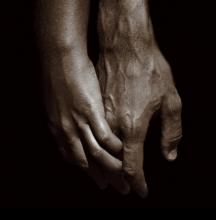
Beyond the realm of churches, religious blogs, and bible colleges, nobody really cares about theology. What does matter is the way you treat other people.
Within Christendom, we’re often taught the exact opposite: that doctrines, traditions, theologies, and distinct beliefs are the only things that do matter. It’s what separates churches, denominations, theologians, and those who are “saved” and “unsaved.”
Historically, Christians have been tempted to categorize the Bible into numerous sets of beliefs that are either inspired or heretical, good or bad, right or wrong — with no room for doubt or questioning or uncertainty.
It’s easy to get caught up in theorizing about God, but within our everyday lives reality is what matters most to the people around us. Theorizing only becomes important once it becomes relevant and practical and applicable to our lives.
When I'm sick, and you bring me a meal, I don't care whether you're a Calvinist or Arminian
Hagar’s Story
Sisters in the Wilderness: The Challenge of Womanist God-Talk, by Delores S. Williams, now professor emerita of theology and culture at Union Theological Seminary, is a landmark in womanist thought. The recently released 20th anniversary edition has a new foreword by Katie G. Cannon. Orbis
Moving Music
Jon Batiste and his band, Stay Human, have played on the New York subway and in other public spaces in free-ranging, mobile performances they call “love riots.” Their album Social Music offers that same positive spirit and a fresh take on jazz. Razor & Tie
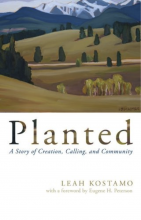
MY MOTHER-IN-LAW wears a bikini. She is 70 years old and decades of gravity have done their work. But she wears a bikini nonetheless, with a devil-may-care nonchalance to what others her age are more inclined to cover in sarongs, ruffles, and cruise-wear.
She’s my hero.
Her okay-ness with her body has a twofold source. First, she’s Finnish. Do you know any Finns? Untouched by the Puritan prudishness that is historically English and North American, they share a continental European lack of modesty concerning the body, but to the extreme. While other Europeans are going topless on the warm and sunny beaches of the French Riviera, the Finns are flinging themselves buck naked from their saunas into the snow. There’s a reason to take off your shirt in the south of France—it’s hot! But why subject your private parts to the crunch and scrape of ice in the dead of winter? I don’t have an answer, even though I live with a Finn who regularly goes in for the naked sauna/snow frolicking thing. But, the point is, Finns are profoundly okay with their bodies.
How does this relate to Christian theology? My mother-in-law is also a devout Christian, and I think her embrace of the bikini as her swimwear of choice goes beyond her Finnish heritage to her biblical understanding of creation. She understands that when it says in the Bible that Adam was formed out of the dirt (adama in Hebrew), that she too is a human formed out of humus and that humus is good. She actually believes that when it says, “God saw all that he had made and it was good,” that means her body as well. It also means mountains and trees and iguanas, but one’s body is a great place to start.

One of the downsides of a theological education (and/or an overactive theological imagination) is an inability to sing some favorite old hymns with naive gusto. During this Christmas season in particular, we simply know too much about the biblical story (and the reality of childbirth and babies in general) to fully believe all of the touching words in some of the most popular Christmas carols.
So as a public service, I have written historically accurate versions of three of the most beloved holiday hymns. Without personally endorsing any of the theology below, I also offer some alternatives to those who don't theologically jive with the current version of "Joy to the World."
FOR CENTURIES Christians have pondered what it means to be created in the image of God. Throughout my own academic career, I’ve been haunted by the mystery of Genesis 1:27: “God created humanity in God’s own image, in the divine image God created them, male and female God created them” (CEB).
What does this passage reveal about us, and consequently, what does it reveal about God? The second half of the passage is equally contentious and challenging. Does “male and female God created them” imply that men and women reflect the image of God equally?
While Genesis 2 to 3, with its narrative of sin and betrayal, is captivating, there is something about the simplicity, mystery, and implications of Genesis 1:27 that resonates even today. I would argue that Genesis 1:27 is the foundation of an egalitarian anthropology where male and female are at the center of theological reflection, where they reflect the image of God without hierarchy or preference. The existence of distinctive genders in humanity does not imply any sort of sexuality within God. Instead, the metaphor retains the unknowability and mystery of God. It reminds us that there are similarities and great differences between the created and Creator. The metaphor “image of God” both reveals and conceals something about the nature of God—and the nature of humanity.
Genesis 1:27 has been a source of inspiration, debate, and controversy throughout the history of Christianity. The church fathers (writing between 150 and 500 C.E.) often implied that women must negate their very womanhood in order to reflect their creation in God’s image. These male writers in the early church viewed female bodies as an impediment to reflecting the image of God. Augustine of Hippo argued that although women spiritually share the image of God, they do soin spiteoftheir bodies—women’s bodies corrupt and diminish their ability to reflect the image of God. In this thinking, women reflect a distorted image; we are inherently deficient.
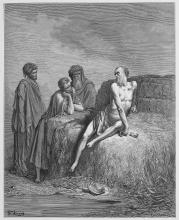
The world of Christian theology has seen its fair share of writings that address horrible suffering and the confusion about God’s character that it causes. The question has been on my mind in light of the Philippines’ calamity. Although satisfying answers are difficult to come by with a topic like this, I offer a few insights that have helped me to continue to trust God’s love. The biblical character of Job shows us how, as believers in a loving God, we should regard and respond to suffering around us.
It no longer surprises me when I hear people express cynicism and doubt about a caring God — I sometimes wonder why more Christians have not done so. Whose faith can remain undisturbed when Typhoon Haiyan kills 5,000 Filipinos and inflicts misery on thousands more? I recall a photo of a woman weeping by her child’s body inside a damaged church. Who can imagine her despair? Can we conceive of the hell endured in the same region by enslaved women and girls who are raped and degraded every day, every hour?

Even as the world’s powers grasped for a last-minute resolution to the crisis in Syria, it remained an open question whether any amount of diplomacy could prevent the conflict from claiming at least one more victim: the classic Christian teaching known as the “just war” tradition.
The central problem is not that the just war doctrine is being dismissed or condemned, but that it is loved too much. Indeed, both sides in the debate over punishing the Syrian regime for using chemical weapons are citing just war theory, but are reaching diametrically opposed conclusions.

Christian conservatives who think Satan is using communism and Islam to bring down America can add a new “adversary” to the list: the Emergent Church movement.
A portion of the upcoming Values Voter Summit in Washington will stray from its usual focus on politics and consider the Emergent Church as one of three “channels the adversary is using to bring America down.” Art Ally, president of The Timothy Plan, a Florida-based mutual fund company devoted to “biblically responsible investing,” will lead the breakout session.
“Why would Satan use Communism? It’s a godless form of government,” said Ally. “Why would Satan use Islam? Same reason. It’s not a religion. It’s a movement to dominate the world under the guise of religion. The Emergent Church plays right into that by weakening further our church community.”
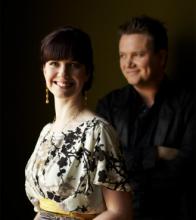
Fans of a beloved contemporary Christian hymn won’t get any satisfaction in a new church hymnal.
The committee putting together a new hymnal for the Presbyterian Church (USA) dropped the popular hymn “In Christ Alone” because the song’s authors refused to change a phrase about the wrath of God.
The original lyrics say that “on that cross, as Jesus died, the wrath of God was satisfied.” The Presbyterian Committee on Congregational Song wanted to substitute the words, “the love of God was magnified.”
The song’s authors, Stuart Townend and Nashville resident Keith Getty, objected. So the committee voted to drop the song.

I live in Texas. To many of its millions of residents, it is the greatest state in the union. We like things big and we like them to be bigger than every other state blessed to be in the Union. Texans are proud of their state; chalk it up to early indoctrination of Texas history throughout the life cycle of Texas Public Education.
But being in Texas, especially East Texas, means that we are sitting squarely and firmly in the buckle of the Bible Belt. The Bible Belt is a term used to describe the area where conservative Christianity is the prominent player in the state’s religiosity; generally this term refers to a high level of conservative, evangelical Christians. This does not mean that you can’t find conservative, evangelical Christians outside of this arbitrary boundary, but for some reason they seem to cluster in these areas in high concentrations.
I didn’t grow up in a church that beat people over the head in church or judged people for they way they acted. I felt loved and welcomed in a place where people were friendly and they loved serving God. I learned about Christ and God’s love for humanity. It wasn’t until I was older that I began to hear more Christians speak more and more on the necessity of evangelizing to people or even being “saved correctly.” I can remember on several occasions a certain church in the town I grew up in going door to door and asking people if they were to die tonight would they go to Heaven. I can remember thinking that it was an odd tactic to get people to come to church. It seemed so stand offish and so self-righteous that it left a bad taste in my mouth.